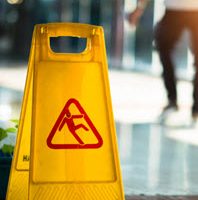Proving a Slip and Fall Case

If you have been injured in a slip and fall on someone else’s property, you may be facing astronomical medical bills, lost wages, and pain and suffering. If your slip and fall accident was due to a hazardous condition on someone else’s property, you may have the right to receive compensation.
Proving Your Slip and Fall Case
One-fifth of all falls result in a severe or serious injury. However, in order to attempt to obtain compensation for your personal injury, and win your claim in court, you will need to prove the following:
- A hazardous or dangerous area was on the property.
- The property owner knew or should have known, that the hazardous or dangerous area existed on their property.
- The property owner should have corrected the dangerous area or hazardous condition or at least set up some sort of warning for patrons, guests, customers or visitors.
- The hazardous or dangerous area or condition on the property directly caused your injury.
No exact definition or set of criteria exists to determine what a hazardous or dangerous condition would be, however, there are some accidents that are more commonly seen that can lead to a personal injury lawsuit listed below.
Common Hazardous Conditions
The most common places where hazardous conditions lead to a personal injury lawsuit include
- Slippery sidewalks or walkways
- Grocery stores
- Hospitals
- Hotels
- Schools
- Parking Lots
- Apartment Buildings
- Department Stores
- Any area with uneven pavements
- Staircases
- Restaurants
While this list is not complete, these are the most common places that slip and fall, or trip and fall, injuries occur due to the property owner’s negligence.
Classification of Visitors
Depending on how a visitor enters a property, there will be different levels of responsibilities and rights owed to them by the property owner.
- A business owner may invite patrons and customers into their business establishment. These visitors are called invitees, and a property owner has a duty to provide reasonable care to keep their property safe for these invitees.
- Any social guest that enters a home or apartment property with permission from the owner is considered a licensee. A property owner must make sure that they warn a licensee about any dangerous or hazardous conditions on the property and take reasonable care to make their property safe for their guests.
- Anyone who is trespassing illegally on a property has no right to any type of duty from the property owner regarding safety. However, if a child wanders onto the property, the “attractive nuisance doctrine” may apply which would require any property owner to reduce the risk of a child wandering on to their property due to any artificial conditions on the property (i.e. swimming pool, etc.)
Contact a Slip and Fall Accident Lawyer
If you have been injured in a slip and fall case, you likely have large medical bills, lost wages, and pain and suffering expenses. If your slip and fall accident was due to the negligence of a property owner, you may have the right to receive compensation for your injuries. Contact an experienced Columbia personal injury attorney at The Stanley Law Group. Call 803-799-4700 and set up a consultation today.
Resource:
https://www.law.cornell.edu/wex/attractive_nuisance_doctrine
https://www.cdc.gov/homeandrecreationalsafety/falls/adultfalls.html
